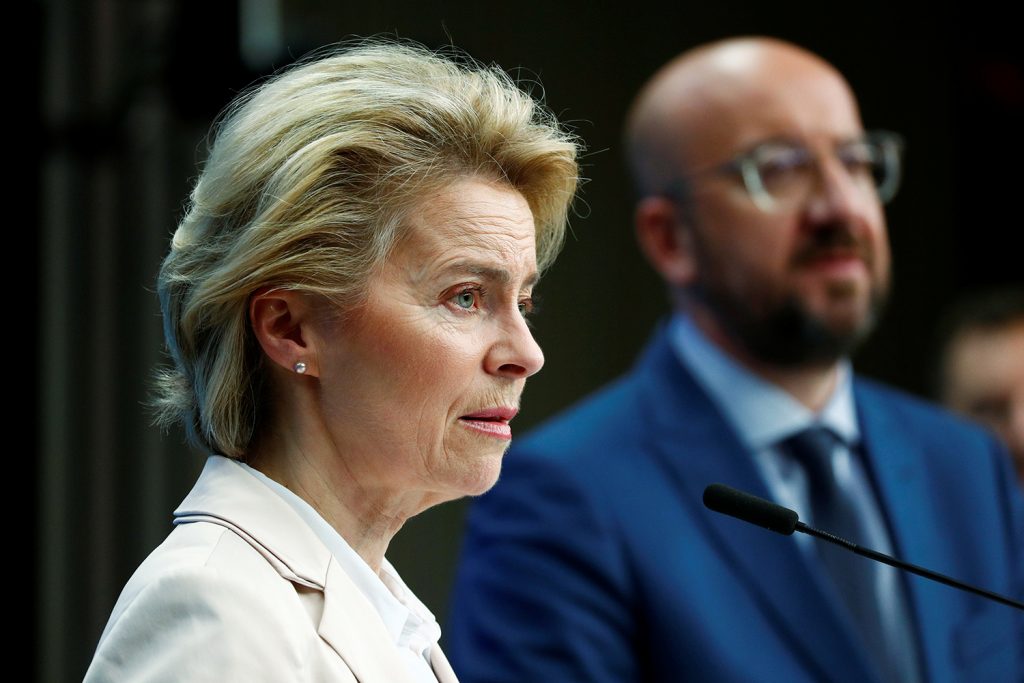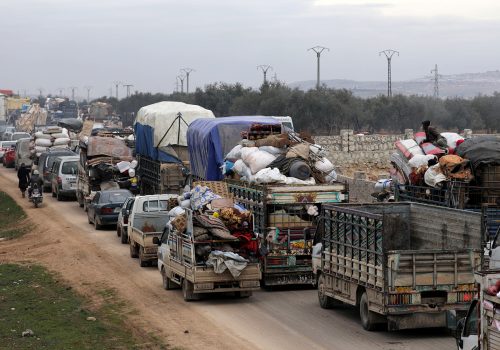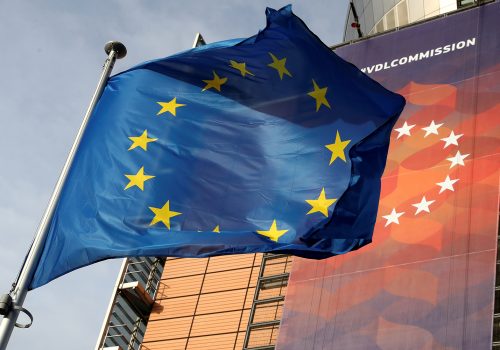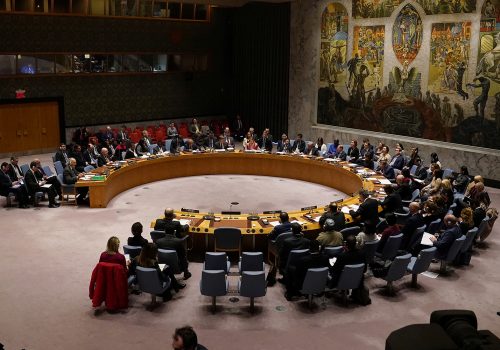The ongoing assault by Russian-backed Syrian government forces on rebels in Idlib province and the announcement by Turkish President Recep Tayyip Erdoğan that Ankara had “opened the doors” to Syrian refugees seeking to reach Europe has set off alarm bells in capitals throughout the European Union that a new migration crisis may be cresting, just as the continent struggles to cope with the coronavirus outbreak emergency.
Erdoğan’s announcement on February 29 that Turkey would no longer prevent Syrians from trying to cross into Europe was justified, he argued, because Turkey could no longer cope with the large number of Syrians fleeing the civil war, a burden made worse by the escalating situation in Idlib. The latest offensive against Idlib by the troops of Bashar al-Assad started in December 2019, but hit a crescendo on February 27, when dozens of Turkish troops—who were stationed in observation posts in Idlib as part of a 2018 agreement between Turkey and the Syrian government—were killed in airstrikes. Ankara responded to the strikes by hitting back against Syrian government forces, shooting down government jets and targeting tanks and artillery positions with drones.
Russian President Vladimir Putin—whose support is critical for the Assad regime—and Erdoğan eventually completed a ceasefire agreement on March 5, but the threat of renewed fighting remains and thousands of Syrians have attempted to leave Idlib for Turkey, further putting pressure on the country’s ability to hold refugees.
Thousands of migrants have massed near Turkey’s borders with Greece and Bulgaria and have been denied entry, amid reports of clashes with Greek police. Turkey and the EU had previously reached a deal in 2016 which saw Turkey block migrants from crossing into Europe in exchange for financial support for the hosting of refugees in Turkey. A meeting between Erdoğan and European Commission President Ursula Von der Leyen and European Council President Charles Michel on March 9 ended without a breakthrough, as Michel said EU Minister for Foreign Affairs Josep Borrell would work with Turkish Foreign Minister Mevlüt Çavuşoğlu to ensure that both sides had “the same interpretation” of the 2016 deal.
Atlantic Council experts respond to Europe’s reaction to the conflict in Idlib and the impasse with Turkey over Syrian refugees:
Pinar Dost, deputy director of the Atlantic Council IN TURKEY:
“Idlib has been a ticking time bomb for many years now. Everyone knew this needed special attention, but Europe didn’t act until asylum seekers arrived on its borders. And this is just the beginning as up to a million people are pushing on Turkey’s borders. If the fragile current cease-fire deal can’t be kept, the situation will worsen.
“Turkey is on the ground [in Syria] to protect its borders and protect civilians. It aims to create a safe zone in Idlib. Since the March 2016 EU-Turkey refugee deal, Turkey has been the border police for Europe to prevent migration flows to Greece. The EU was very much satisfied with the deal. Four years later, Turkey is being criticized with opening its borders and not complying with the deal’s obligations. The same is true for the EU which didn’t do much to keep its commitments made to Turkey under the deal. Things have changed since 2016. With around 3.7 million Syrian refugees on its soil and having spent around $40 billion dollars, Turkish officials have been repeatedly asking for help from the international community over Idlib and announcing that Turkey won’t be able to handle a new influx of refugees alone. Turkey needs stronger and more sincere support from the EU. With Turkey’s recent moves, it looks like the EU will not be able to close its eyes to the situation in Idlib and will also need to come up with a more sustainable humanitarian solution to the problem other than the 2016 deal. One shouldn’t forget after all that the question here is about civilians’ lives. Scenes from both the Turkey-Syria border and Turkey-Greece borders are heartbreaking. It is neither Turkey’s nor Greece’s role to act as Europe’s “shield.”
“As a first step, the EU should exercise active diplomacy to ensure a no-fly zone over Idlib and provide humanitarian assistance to civilians in the province, which would help calm down the situation.”
“This is also an opportunity for the EU to succeed where it failed in 2015, i.e. working on a common migration policy and sharing the burden with neighbors and within the bloc for hosting refugees and processing asylum claims in line with the international and EU law.”
Ambassador Michel Duclos, nonresident senior fellow at the Rafik Hariri Center for the Middle East:
“The European reaction to the Idlib crisis—and to the Moscow [ceasefire] agreement between Erdoğan and Putin—has been characteristically confused. The new European Commission is supposed to be geopolitically minded. By contrast, the various communiques coming from Brussels reiterate the usual tedious language on the need for a ceasefire, humanitarian concerns, and the willingness to address a new refugee crisis. Plus ça change, plus c’est la même chose. Of course, there is no more unity than before: this time German Chancellor Angela Merkel and the Dutch foreign minister suggest that a no-fly zone should be set up in Idlib, but the French are not supportive, and EU Foreign Minister Borell shows a clear lack of enthusiasm. It also has to be said that President Erdoğan’s statements are not making things easier. All of Europe’s attention needs to be placed in showing solidarity with Greece and Bulgaria in the context of the flow of refugees sent to their borders by the Turkish authorities.
“The recent events in Syria, however, may create a new awareness among European decisionmakers on the potential geopolitical realignment that is at stake in Idlib. In a way, Idlib represents a moment of geopolitical truth. The ceasefire decided in Moscow on March 5 is not sustainable under the current conditions. If Turkey is left with no help in its dialogue with Russia, they will sooner or later have to accede to the Russian agenda. In the case of Idlib, that would mean, after some time, potentially a total reconquest of the province by Damascus and its sponsors—and a huge movement of millions of displaced persons to Turkey and to Europe. Many terrorists would also flee the mountains of Idlib to take refugee elsewhere, including in Europe.
“In this context, the case should be made for a partial reengagement of Europe towards Turkey. A coalition of willing should help Turkey—especially in the field of counterterrorism—to assure an effective implementation of the Moscow agreement as the only way to avoid the above scenario of a reconquest of the region by Assad. Of course, the United States should be part of such an endeavour. An opening towards Ankara on Idlib would place European countries and NATO in a better place to raise with Ankara their concerns on the S400 missile defense deal or Turkey’s policies around Cyprus and in Libya.
“Helping Turkey in Idlib would also be an opportunity to reinter the larger game in Syria. It would entail a potential signal of strength vis-à-vis Moscow, or at least of a new commitment, where previously the Russians were in the habit of seeing Europeans completely absent from the Syrian conflict. One of the lessons to be drawn from the recent developments in Idlib is that the war in Syria is far from being over. A partial reengagement by Europe towards Turkey should be complemented by a new involvement in the political process to deal with the Syrian crisis. One may hope that those issues will be dealt with in a scheduled summit meeting between President Erdogan, Chancellor Merkel, French President Emmanuel Macron, and British Prime Minister Boris Johnson.”
Katerina Sokou, nonresident senior fellow in the Atlantic Council’s Future Europe Initiative:
“Ignoring the crisis in Syria is no longer an option for European countries. As border states are faced with renewed migration pressures after Turkey opened its borders and actively encouraged migrants and refugees to flee to Europe, the European Union finds itself between a rock and a hard place. The ceasefire in Idlib cannot be counted on to stabilize the situation, absent a political agreement to reinvigorate the EU-Turkey 2016 agreement.
“By opening its borders, Turkey violated its commitment to control migration flows to Europe and has since asked for the renegotiation of that agreement, even as the EU is clinging on it. The agreement offered Turkey various incentives that were to come into effect in stages, but the pace of reimbursing the promised 6 billion Euros has proved too slow to satisfy Turkey. Yet the agreement was never fully implemented in the EU either, as member states declined to take in their share of existing refugees, leaving border states with social and economic implications that have pushed local communities to the brink.
“From its inception, the 2016 letter was criticized by refugee organizations. Yet its unravelling reveals an even more precarious situation for the migrants and refugees it aims to manage, as Turkey is currently using them as political pawns to force concessions by the EU. So, if the agreement is to hold, the EU will need to demand an end of the standoff at its borders before facilitating the reimbursement of almost 3 billion still on the table for Turkey. A credible roadmap to visa liberalization for Turkish citizens would also provide a valuable incentive for Turkey to work with the EU. At the same time, Europe should move swiftly to support border states by actually sharing their burden. Longer term, a common asylum policy is the only sustainable way to keep the EU united under future migration pressures.
“At the same time, Europe should not give in to Turkey’s pressure and agree to its controversial proposal of a safe zone that would move refugees from Turkey to Syria. The EU has indicated that it cannot support or fund the demographic engineering of a region. Yet it should revisit German Defense Minister’s Annegret Kramp-Karrenbauer 2019 plan and take the initiative to create an internationally controlled security zone across the Syria-Turkey border. That would alleviate any new refugee pressures on Turkey and contribute to a lasting cessation of hostilities, helping the parties return to the UN-facilitated political process mandated by resolution 2254.”
Charles Thépaut, visiting fellow at the Washington Institute:
“The European response to Idlib has been dominated by two factors. The first factor is the refusal to resort to military options in Syria that could create a risk of direct escalation with Russia. Europe and the United States have throughout the Syrian conflict looked for diplomatic ways to engage Moscow and pressure the Syrian regime.
“The second factor is the deterioration of the dialogue with Turkey. Ankara’s operation in northeastern Syria in October 2019 drew strong opposition from European countries and complicated Turkey’s relationship with Europe. The refugee influx at the Greek-Turkish border has not improved relations and Europe’s priority has been to show solidarity with its border member states.
“The United States has called on Europe to increase its support for Turkey in an attempt to pull Ankara away from better relations with Moscow, but this cannot happen if all the attention is focused on the Greek/Turkish blame game on refugees. Increased European support is available, but it requires a reset of the EU-Turkish dialogue on Syria and beyond.
“In addition to the migration issue, Turkey and Europe need to reach common understandings on other points of contention in their relationship, such as the Syrian Democratic Forces (SDF) in northeastern Syria—which Turkey considers a terrorist organization—the continued presence of terrorist groups in northwestern Syria, as well as Turkey’s intervention in Libya.
“On all these issues, the key question the Europeans would like Turkey to answer is whether Ankara favors closer relations with Russia—even after the flareup in Idlib—or if Turkey remains committed to stronger partnership with its NATO allies.”
David A. Wemer is associate director, editorial at the Atlantic Council. Follow him on Twitter @DavidAWemer.
Further reading:
Image: EU Council President Charles Michel and European Commission President Ursula von der Leyen hold a news conference following a meeting with Turkish President Tayyip Erdogan in Brussels, Belgium March 9, 2020. REUTERS/Francois Lenoir



